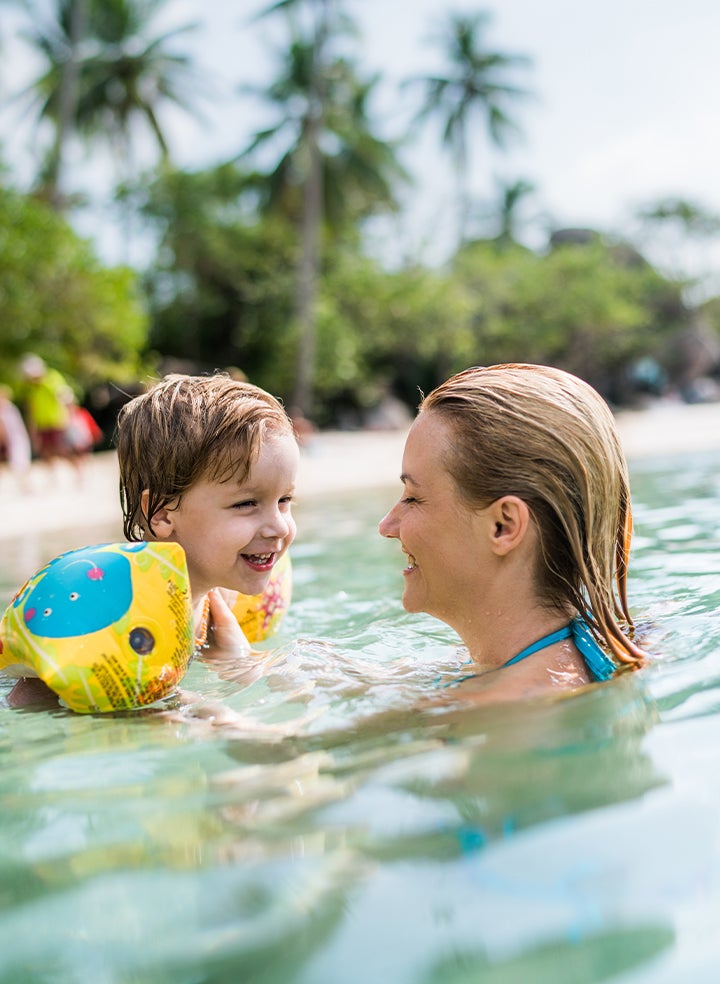Water Safety Tips
Let's help keep fun family activities safe this season. Celebrate Water Safety Month with us with these tips.

July is Water Safety Month
Swimming is the most popular summer activity, but it can also be a very dangerous one. An average of 10 people drown each day in the U.S., according to the American Red Cross. Furthermore, drowning is the No. 1 cause of death for children younger than 5. Fortunately, there are many ways to keep your family safe around water this summer. The best thing you can do is to enroll in age-appropriate swim lessons.
There are also many free or inexpensive water-safety aids. Print out the U.S. Consumer Product Safety Commission’s Pool Safety Pledge at poolsafely.gov/pledge. Children pledge to never swim alone, to ask for swimming lessons, to stay away from pool and spa drains and to be safe. Adults pledge to designate “water watchers,” make sure their children can swim, learn CPR, and make their pools safe. You can also download a “water watcher card,” a tag you wear, then pass to another adult when you delegate the responsibility of watching others in the pool or at the beach, instead of casually telling them you are leaving.
Make Water Safety Your Priority
Swim in designated areas supervised by lifeguards.
Always swim with a buddy; do not allow anyone to swim alone. Even at a public pool or a lifeguarded beach, use the buddy system!
Ensure that everyone in the family learns to swim well. Enroll in age-appropriate Red Cross water orientation and Learn-to-Swim courses.
Never leave a young child unattended near water and do not trust a child’s life to another child; teach children to always ask permission to go near water.
Have young children or inexperienced swimmers wear U.S. Coast Guard-approved life jackets around water, but do not rely on life jackets alone.
Establish rules for your family and enforce them without fail. For example, set limits based on each person’s ability, do not let anyone play around drains and suction fittings and do not allow swimmers to hyperventilate before swimming underwater or have breath-holding contests.
Even if you do not plan on swimming, be cautious around natural bodies of water including ocean shoreline, rivers, and lakes. Cold temperatures, currents, and underwater hazards can make a fall into these bodies of water dangerous.
If you go boating, wear a life jacket! Most boating fatalities occur from drowning.
Avoid alcohol use. Alcohol impairs judgment, balance, and coordination; affects swimming and diving skills; and reduces the body’s ability to stay warm.
Prevent Unsupervised Access to the Water
Install and use barriers around your home pool or hot tub. Safety covers and pool alarms should be added as additional layers of protection.
Ensure that pool barriers enclose the entire pool area, are at least 4-feet high with gates that are self-closing, self-latching and open outward, and away from the pool. The latch should be high enough to be out of a small child’s reach.
If you have an above-ground or inflatable pool, remove access ladders and secure the safety cover whenever the pool is not in use.
Remove any structures that provide access to the pool, such as outdoor furniture, climbable trees, decorative walls, and playground equipment.
Keep toys that are not in use away from the pool and out of sight. Toys can attract young children to the pool.
Maintain Constant Supervision
Actively supervise kids whenever around the water—even if lifeguards are present. Do not just drop your kids off at the public pool or leave them at the beach—designate a responsible adult to supervise.
Always stay within arm’s reach of young children and avoid distractions when supervising children around water.
Know What to Do in an Emergency
If a child is missing, check the water first. Seconds count in preventing death or disability.
Know how and when to call 9-1-1 or the local emergency number.
If you own a home pool or hot tub, have appropriate equipment, such as reaching or throwing equipment, a cell phone, life jackets and a first aid kit.
